
Millet Kheer: A Wholesome Dessert Blending Tradition and Nutrition
By Organic Gyaan
Millet kheer is a wholesome twist to traditional dessert—rich in fiber, calcium, and flavor. A perfect blend of health, tradition, and indulgence!
Read more




Kodo Millet, also known as Kodra, Varagu Millet, Koden, Arikelu, Harka, or Koovaragu, is a nutrient-rich grain known for its powerful blood-purifying properties, high fiber content, and ability to regulate blood sugar levels. With 4x more fiber than rice, it supports digestion, strengthens the heart, and is especially beneficial for diabetics and those with blood-related disorders. Choosing organic kodo millet ensures you’re getting the purest form of this healing grain, packed with all its natural goodness.
These remarkable kodo millet benefits have been recognized for centuries, especially in natural healing and blood detox routines.
Fermenting kodo millet enhances its probiotic benefits, improves nutrient absorption, and strengthens gut health—making it one of the best ways to consume this healing grain.
How to Ferment Cooked Kodo Millet/Koovaragu/Kodra:
This traditional preparation method brings out the best in unpolished kodo millet, making it one of the most effective kodo millet uses for internal cleansing and gut support.
Dr. Khadar Sir’s Recommended Millet Routine for Blood Purification & Diabetes Management
Following this cycle in Ambali form helps with natural detoxification and regulating blood sugar using grains like varagu millet and organic kodo millet.
Proper handling ensures you benefit from all the benefits of kodo millet, without losing key nutrients during prep.
Kodo Millet is versatile and easy to cook, making it a great alternative to rice and wheat.
Best for: Khichdi, porridge ( ambali ), pulao, dosa & detox meals.
Soaking Tip: Soak for 6-8 hours before cooking for better absorption.
Water Ratio for Cooking:
Looking for freshness and purity? Purchase kodo millet online in smaller batches for the best results, especially when sourcing organic kodo millet.
From gut support to blood sugar control, the kodo millet benefits cover a wide spectrum of health needs.
Choosing unpolished kodo millet means choosing integrity, purity, and deep nourishment—straight from the earth to your kitchen.
Cleanse your body, balance your sugar levels, and strengthen your heart with the ultimate blood-purifying millet. Try Kodo Millet today!
1. What are Kodo Millet/Koovaragu/Kodra?
Kodo millets, known as Varagu Arisi, are nutritious grains native to Southeast Asia, ideal for semi-arid regions' diets.
2. What are the health benefits of Kodo Millet/Koovaragu/Kodra?
Rich in fiber, protein, low glycemic index, and gluten-free, Kodo millets support blood sugar control and overall health.
3. Can Kodo Millets/Koovaragu/Kodra be used as a substitute for rice or wheat?
Yes, Kodo millets can replace rice or wheat in recipes like porridge, roti, and dosa due to their versatility.
4. How to Cook Kodo Millets/Koovaragu/Kodra?
Rinse and boil Kodo millets with a 2:1 water ratio for about 15 minutes until soft, similar to cooking rice.
5. How to Store Kodo Millets/Koovaragu/Kodra?
Store in a cool, dry place in an airtight container for up to six months to maintain freshness.
6. How are kodo millets/Koovaragu/Kodra different from other millets?
Kodo millets are one of the several types of millets and have a unique flavor, texture, and nutrient profile.
7. The nutritional profile of kodo millet/Koovaragu/Kodra:
Additionally, varagu arisi are free from gluten and rich in B vitamins, copper, and zinc.
8. Can kodo millet/Koovaragu/Kodra be included in a healthy diet?
Yes, kodo millets can be included in a healthy diet for their high nutritional value and gluten-free nature.
9. Can a pregnant lady eat varagu millet?
Yes, beneficial for pregnant women due to high nutrients, but consult healthcare providers for personalized advice.
10. When can kodo millet/Koovaragu/Kodra be given to babies?
Introduce Kodo millet at 6-8 months old after other grains, with pediatrician consultation for allergies.
11. Is kodo millets/Koovaragu/Kodra gluten-free?
Yes, kodo millets are naturally gluten-free.
12. What are some common dishes made from kodo millets/Koovaragu/Kodra?
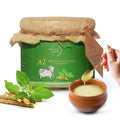 Best Quality Guaranteed
Best Quality Guaranteed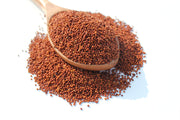 Free from Chemical & Pesticides | NO GMO
Free from Chemical & Pesticides | NO GMO
 Best Quality Guaranteed
Best Quality Guaranteed Free from Chemical & Pesticides | NO GMO
Free from Chemical & Pesticides | NO GMO
 Best Quality Guaranteed
Best Quality Guaranteed Free from Chemical & Pesticides | NO GMO
Free from Chemical & Pesticides | NO GMO
 Best Quality Guaranteed
Best Quality Guaranteed Free from Chemical & Pesticides | NO GMO
Free from Chemical & Pesticides | NO GMO
 Best Quality Guaranteed
Best Quality Guaranteed Free from Chemical & Pesticides | NO GMO
Free from Chemical & Pesticides | NO GMO
 Best Quality Guaranteed
Best Quality Guaranteed Free from Chemical & Pesticides | NO GMO
Free from Chemical & Pesticides | NO GMO
 Best Quality Guaranteed
Best Quality Guaranteed Free from Chemical & Pesticides | NO GMO
Free from Chemical & Pesticides | NO GMO
 Best Quality Guaranteed
Best Quality Guaranteed Free from Chemical & Pesticides | NO GMO
Free from Chemical & Pesticides | NO GMO
 Best Quality Guaranteed
Best Quality Guaranteed Free from Chemical & Pesticides | NO GMO
Free from Chemical & Pesticides | NO GMO
 Best Quality Guaranteed
Best Quality Guaranteed Free from Chemical & Pesticides | NO GMO
Free from Chemical & Pesticides | NO GMO
 Best Quality Guaranteed
Best Quality Guaranteed Free from Chemical & Pesticides | NO GMO
Free from Chemical & Pesticides | NO GMO
 Best Quality Guaranteed
Best Quality Guaranteed Free from Chemical & Pesticides | NO GMO
Free from Chemical & Pesticides | NO GMO
 Best Quality Guaranteed
Best Quality Guaranteed Free from Chemical & Pesticides | NO GMO
Free from Chemical & Pesticides | NO GMO
 Best Quality Guaranteed
Best Quality Guaranteed Free from Chemical & Pesticides | NO GMO
Free from Chemical & Pesticides | NO GMO
 Best Quality Guaranteed
Best Quality Guaranteed Free from Chemical & Pesticides | NO GMO
Free from Chemical & Pesticides | NO GMO
 Best Quality Guaranteed
Best Quality Guaranteed Free from Chemical & Pesticides | NO GMO
Free from Chemical & Pesticides | NO GMO
 Best Quality Guaranteed
Best Quality Guaranteed Free from Chemical & Pesticides | NO GMO
Free from Chemical & Pesticides | NO GMO
 Best Quality Guaranteed
Best Quality Guaranteed Free from Chemical & Pesticides | NO GMO
Free from Chemical & Pesticides | NO GMO
 Best Quality Guaranteed
Best Quality Guaranteed Free from Chemical & Pesticides | NO GMO
Free from Chemical & Pesticides | NO GMO
 Best Quality Guaranteed
Best Quality Guaranteed Free from Chemical & Pesticides | NO GMO
Free from Chemical & Pesticides | NO GMO

By Organic Gyaan
Millet kheer is a wholesome twist to traditional dessert—rich in fiber, calcium, and flavor. A perfect blend of health, tradition, and indulgence!
Read more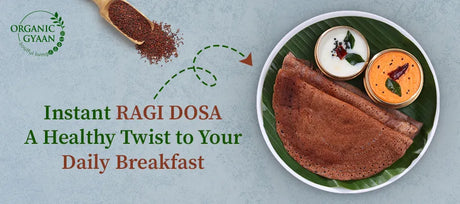
By Organic Gyaan
Instant Ragi Dosa is your perfect 15-min satvik breakfast—gluten-free, diabetic-friendly, and rich in calcium, fiber, and plant protein. Try it today!
Read more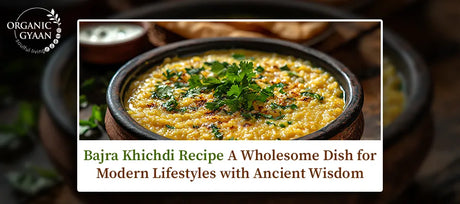
By Organic Gyaan
Discover the goodness of bajra khichdi—a simple, nourishing meal packed with fiber, protein, and ancient wisdom for modern, mindful living.
Read more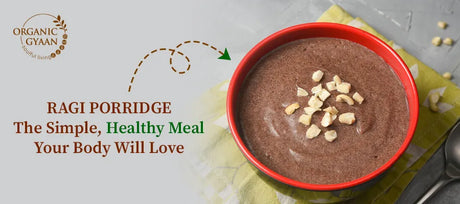
By Organic Gyaan
Ragi porridge is a simple, nourishing meal rich in calcium, fiber, and iron—perfect for kids, diabetics, and anyone seeking wholesome wellness.
Read more
By Organic Gyaan
Looking for a wholesome, plant-based meal? Try Millet Rajma Salad—a high-protein, low-GI, fiber-rich recipe perfect for diabetes, weight loss, and energy.
Read more
By Organic Gyaan
Millet pongal is the ultimate comfort food—wholesome, gut-friendly, and perfect for weight loss, diabetes, and daily nourishment. A smart, tasty swap!
Read more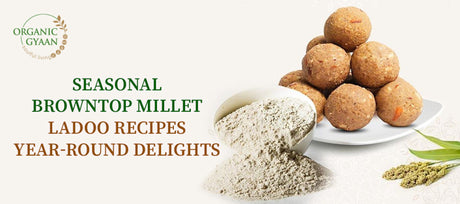
By Organic Gyaan
Brown Top Millet Ladoo is a nutritious and delicious snack that combines the goodness of brown top millet with the richness of traditional Indian sweets.
Read more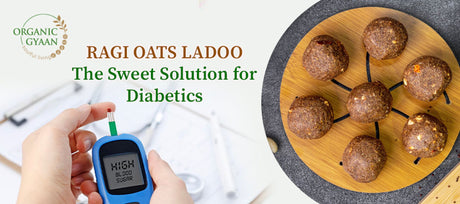
By Organic Gyaan
The Ragi Oats Ladoo, a harmonious blend of these two ingredients, emerges as a perfect snack for people looking to manage their blood sugar levels effectively.
Read moreWe currently ship to the United States, Canada, Australia and the UK. To enquire about shipping to a different destination, please contact us.
Standard shipping normally takes 3-5 days. Next day shipping is available on all domestic orders (for an additional charge). International shipping times depend on the products and destination (estimated at checkout).
Items must be returned within 30 days after receiving your order. Items must be returned in the same condition in which they were received, be unworn/unused, have any tags still attached, and include all the original packaging.
Refunds are processed within 7 days from when we receive the item(s).






Kodo Millet, also known as Kodra, Varagu Millet, Koden, Arikelu, Harka, or Koovaragu, is a nutrient-rich grain known for its powerful blood-purifying properties, high fiber content, and ability to regulate blood sugar levels. With 4x more fiber than rice, it supports digestion, strengthens the heart, and is especially beneficial for diabetics and those with blood-related disorders. Choosing organic kodo millet ensures you’re getting the purest form of this healing grain, packed with all its natural goodness.
These remarkable kodo millet benefits have been recognized for centuries, especially in natural healing and blood detox routines.
Fermenting kodo millet enhances its probiotic benefits, improves nutrient absorption, and strengthens gut health—making it one of the best ways to consume this healing grain.
How to Ferment Cooked Kodo Millet/Koovaragu/Kodra:
This traditional preparation method brings out the best in unpolished kodo millet, making it one of the most effective kodo millet uses for internal cleansing and gut support.
Dr. Khadar Sir’s Recommended Millet Routine for Blood Purification & Diabetes Management
Following this cycle in Ambali form helps with natural detoxification and regulating blood sugar using grains like varagu millet and organic kodo millet.
Proper handling ensures you benefit from all the benefits of kodo millet, without losing key nutrients during prep.
Kodo Millet is versatile and easy to cook, making it a great alternative to rice and wheat.
Best for: Khichdi, porridge ( ambali ), pulao, dosa & detox meals.
Soaking Tip: Soak for 6-8 hours before cooking for better absorption.
Water Ratio for Cooking:
Looking for freshness and purity? Purchase kodo millet online in smaller batches for the best results, especially when sourcing organic kodo millet.
From gut support to blood sugar control, the kodo millet benefits cover a wide spectrum of health needs.
Choosing unpolished kodo millet means choosing integrity, purity, and deep nourishment—straight from the earth to your kitchen.
Cleanse your body, balance your sugar levels, and strengthen your heart with the ultimate blood-purifying millet. Try Kodo Millet today!
1. What are Kodo Millet/Koovaragu/Kodra?
Kodo millets, known as Varagu Arisi, are nutritious grains native to Southeast Asia, ideal for semi-arid regions' diets.
2. What are the health benefits of Kodo Millet/Koovaragu/Kodra?
Rich in fiber, protein, low glycemic index, and gluten-free, Kodo millets support blood sugar control and overall health.
3. Can Kodo Millets/Koovaragu/Kodra be used as a substitute for rice or wheat?
Yes, Kodo millets can replace rice or wheat in recipes like porridge, roti, and dosa due to their versatility.
4. How to Cook Kodo Millets/Koovaragu/Kodra?
Rinse and boil Kodo millets with a 2:1 water ratio for about 15 minutes until soft, similar to cooking rice.
5. How to Store Kodo Millets/Koovaragu/Kodra?
Store in a cool, dry place in an airtight container for up to six months to maintain freshness.
6. How are kodo millets/Koovaragu/Kodra different from other millets?
Kodo millets are one of the several types of millets and have a unique flavor, texture, and nutrient profile.
7. The nutritional profile of kodo millet/Koovaragu/Kodra:
Additionally, varagu arisi are free from gluten and rich in B vitamins, copper, and zinc.
8. Can kodo millet/Koovaragu/Kodra be included in a healthy diet?
Yes, kodo millets can be included in a healthy diet for their high nutritional value and gluten-free nature.
9. Can a pregnant lady eat varagu millet?
Yes, beneficial for pregnant women due to high nutrients, but consult healthcare providers for personalized advice.
10. When can kodo millet/Koovaragu/Kodra be given to babies?
Introduce Kodo millet at 6-8 months old after other grains, with pediatrician consultation for allergies.
11. Is kodo millets/Koovaragu/Kodra gluten-free?
Yes, kodo millets are naturally gluten-free.
12. What are some common dishes made from kodo millets/Koovaragu/Kodra?
Weight
HIGH NUTRITIONAL VALUE
Organic foods preserve far more vitamins & minerals
NO CHEMICALS & PESTICIDES
We don’t use artificial fertilisers or additives in our food
CERTIFIED ORGANIC SOURCES
Our products quality is verified by top certification bodies
PRESERVES THE ENVIRONMENT
Sustainable farming ensures soil conversation & reduced air pollution